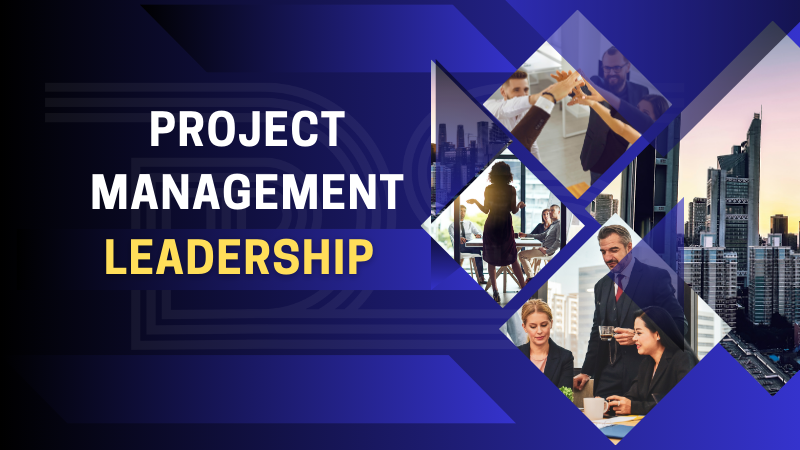
by DharamCW | Sep 26, 2024 | Leadership in Project Management
Project management is becoming an essential component of modern business operations. Organizations increasingly use project management to monitor and assess projects and ensure they meet their objectives. Project management entails several complex processes, including project planning, organization, management, control, budgeting, monitoring, testing, and implementation.
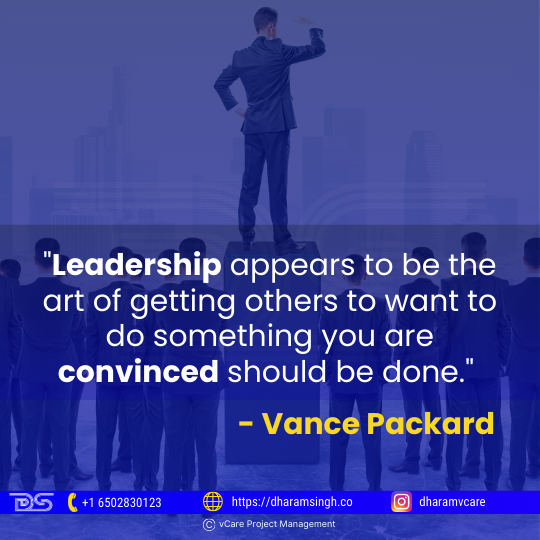
Vance Packard Quote
Project leadership is the art and science of guiding a team to successful project completion. When project leadership brings people together to work toward a similar objective, the team can do more than they could individually.
Project Management Leadership
Leadership in project management is a necessary ability for completing the project. Like in other business areas, leadership necessitates demonstrating several talents and behaviors in a project context. Leadership is essential to ensure the success of the projects, from team leadership to project governance.
Leadership and project management are closely intertwined. Setting the vision and encouraging the team to work together to accomplish the project goal are vital components of leadership. In a project environment, this is particularly significant. Delivering any project requires a team effort. While some teams work without a clear leader, in business, it is customary for someone to be in the leadership role, guiding and directing the team toward their goals. On the other hand, project management systematically applies processes, methods, knowledge, skills, and experience to achieve the project objectives. Effective project management often requires strong leadership to guide the team through the project’s complexities and challenges.
5 Essential Project Leadership Skills
Project managers execute allocated project tasks through their project teams. They learn the technical, business, and leadership skills to manage their project teams effectively. In addition, they use strong leadership skills to motivate their teams to complete project deliverables and achieve project goals.
Project managers’ essential leadership skills begin with encouraging and inspiring their teams. However, the five critical project leadership skills are equally vital in enhancing team performance.
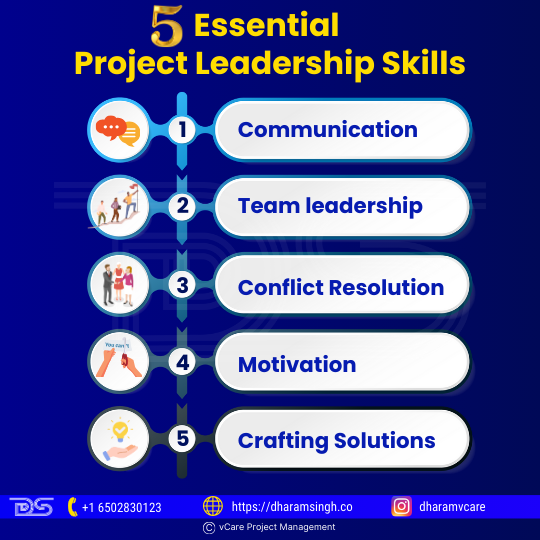
5 Essential Project Leadership Skills
- Communication
One of the most important project management skills is communication. Leaders must communicate effectively because a significant portion of their work includes collaboration. If you can communicate, you can collaborate properly.
Leaders can communicate ideas to people and groups in person, over the phone, or via web conferencing. They can also present their ideas to ensure the message is shared and understood. However, communication is more than just passing on messages and conversing with people. Communication is one of the most important characteristics of a project manager, especially in a leadership role.
- Team leadership
The leader establishes the vision and motivates others. Someone with outstanding project leadership skills fosters team agreement and togetherness while managing day-to-day operations.
Team leadership on projects entails establishing an environment in which everyone may thrive. People are lured to the project culture that surrounds them. Stakeholders want to be part of the project because they know you will complete the task while creating a pleasant working environment.
- Conflict resolution
Conflict is unavoidable when introducing or modifying something. However, effective leaders understand how to use conflict to their advantage since the finest solutions emerge when ideas are challenged.
Conflict may benefit teams by allowing all voices to be heard and opposing viewpoints to be expressed, frequently resulting in a better solution and more successful project outcomes. However, leaders must be equipped with conflict resolution skills to recognize and address conflict before it becomes a problem for the team. Therefore, another crucial core competency of project management is dealing with conflict in various ways.
- Motivation
Leaders motivate others to act even when they are not technically in charge. As a project manager, one determines what makes the other team members feel they’re giving their best. The project leader should do their best to deliver this. Everyone is driven differently, and motivation changes over time. Great leaders see these disparities and establish a great work environment to enable their workers to achieve their full potential.
- Crafting solutions
Empowering the team and the larger stakeholder community to participate in developing solutions is part of fostering a positive working culture. That entails removing roadblocks so that each team member may fulfill their work and contribute new ideas without concern about something getting in the way.
Empowering leaders also allows them to make decisions down the hierarchy to the lowest feasible level, allowing specialists to judge the solutions required to keep the project going. This empowerment fosters a positive working culture and inspires team members to take ownership of their work and contribute to the project’s success.
Leadership Styles and Theories
There is no single style to leadership, nor is there a particular type of person who makes a great leader. Instead, according to project leadership theory, a great leader is a mix of traits and the capacity to adapt to diverse conditions. This adaptability reassures individuals that leadership is not a fixed trait but a skill that can be developed and enhanced.
Leadership is something one can learn, and one can enhance one’s talents by understanding leadership theories in management. The three basic leadership theory categories that apply to project delivery are:
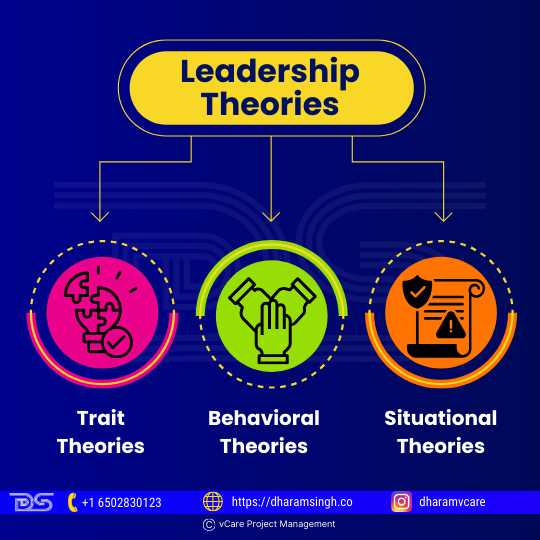
Leadership Theories
- Trait theories
Project manager strengths are related to trait theories. This perspective on leadership identifies the abilities and attributes that are beneficial while leading a team. Resilience, honesty, trustworthiness, aggressiveness, and so on are examples.
There was a system of thinking that stated certain characteristics were innate and that you were either born with them or not. Fortunately, this notion is no longer present in leadership concepts and theories. We know that an individual can act to become more aggressive and resilient or develop any other leadership trait.
- Behavioral theories
Behavioral leadership theories concern what a leader does. For example, some Corporate leaders are dictatorial and make decisions without consulting their employees. Others are more collaborative, inviting feedback and empowering their employees.
Both strategies are acceptable, and any combination of the two. However, there is a time and place for every style: you wouldn’t expect a combat leader to order a huddle so the team could discuss possibilities, would you? In that case, a choice must be taken immediately. Thus, a collaborative, listening leadership style would better engage the community.
- Situational theories
Situational leadership is deciding which leadership style to employ in any given scenario. These leadership theories are often known as contingency theories.
They analyze whether using a task-based or a people-based approach is more effective. They also take into account the individuals you lead. What type of encouragement and support do they require? A leader tailors their leadership style to the demands of the team, the business environment, and project circumstances. Someone who has never done specific work before will require more hands-on assistance from their team leader than someone confident in completing that activity.
Project Management Leadership Styles
Leadership in project management is essential for success. A project is a substantial and necessary endeavor in any business organization that requires full concentration and dedication from all participants. The success or failure of any business project can influence the company’s path. Project management is a critical role that may be entrusted to anybody, especially in today’s technology-driven business environment, where change is inescapable.
The ultimate success of every project is determined by project leaders, who have the authority to manage and oversee all project activities and make critical project choices. Similarly, failure to accomplish project objectives is the responsibility of the project’s leaders or management. Failure or inability to use the authority conferred upon them to ensure the project’s success is regarded as a point of accountability.
It is important to note that any project a firm does should strive to achieve certain goals that will enhance business operations and increase profitability, performance, output, and overall success in its objectives. As a result, project management is a critical function that leaders and anybody charged with project leadership must take seriously and utilize their effective leadership skills to ensure success.
Here are the six important project management leadership styles.
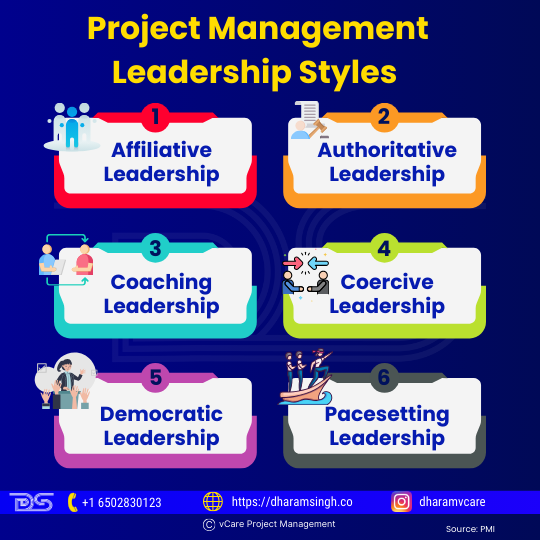
Project Management Leadership Styles
- Affiliative Leadership
This leadership style has a positive impact on a project team. This leader aims to create emotional bonds inside the organization to generate a sense of belonging and connection. When teammates require personal assistance or the team has to rebuild trust, the affiliative strategy is most successful. Because a single focus on praising and nurturing may result in poor performance and a lack of direction, this strategy should be used in various ways.
- Authoritative Leadership
Authoritarian leaders generate an entrepreneurial spirit and a strong devotion to the cause. Moreover, the traditional method works effectively when the team needs a new vision owing to changing circumstances or when clear guidance is unnecessary. Therefore, more utilization of this style would result in better project team outcomes without negative consequences, as this style has a generally positive effect throughout the organization.
- Coaching Leadership
This project management approach encourages team members to expand their capacity and capability as project contributors, which benefits the whole project team. This approach is the most effective coaching technique when a leader wants to assist colleagues in creating long-term personal characteristics that will help them succeed. However, it falls short when teammates are relentless about staying the same or learning or when the leader needs more aptitude.
- Coercive Leadership
Project managers rarely use this tactic, which would be more evident in times of crisis, such as when a project deadline was approaching and at risk of being missed.
- Democratic Leadership
This leader achieves successful compromises through teamwork. In a PMO, for example, each team member contributes to defining and measuring the PMO’s objectives. When the leader wants the team to buy into or own a decision, strategy, or goal, or when they are unsure and need new ideas from competent colleagues, the democratic method works well.
- Pacesetting Leadership
This leader anticipates self-management. The pacesetting approach works most effectively when the team is already motivated and talented and the leader demands quick results. This approach is popular, especially when a project nears major milestones. Although this method generally harms project teams, it can be beneficial in some situations.
Impact of Good Leadership on a Project
Many studies have highlighted leadership as one of the key reasons for project failure. On the other hand, projects with strong leadership and organizational support outperform those without.
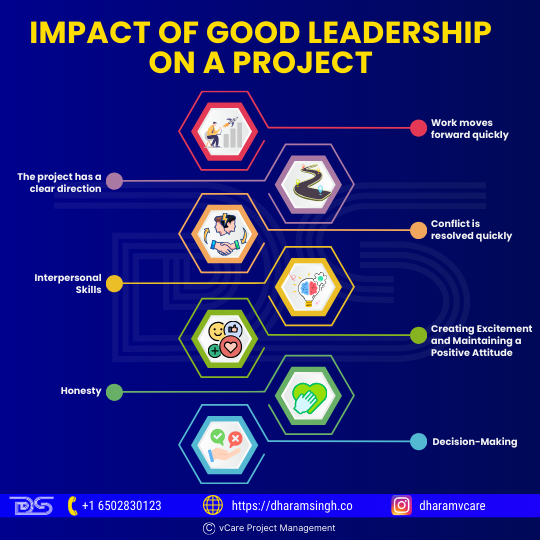
Impact of Good Leaders on a Project
- Work moves forward quickly
When an individual actively leads, the work proceeds quickly as the choices are made on time. This move allows the project to be completed on schedule while delivering all planned project scope elements.
- The project has a clear direction
A leader ensures that the team knows and supports a common goal. A clear direction gives context for decision-making and ensures that everyone knows what the project will deliver.
- Conflict is resolved quickly
The project leader is constantly looking for conflict and can intervene to handle it before it escalates into a crisis.
- Interpersonal Skills
Project leaders must have interpersonal skills such as questioning, listening, and speaking to establish successful and compelling interactions with team members.
Experts in project management believe that projects are more likely to fail if project managers lack excellent interpersonal skills. Because much of a project manager’s duties involve communicating with stakeholders, one must have great interpersonal skills to lead from the front.
- Creating Excitement and Maintaining a Positive Attitude
The most crucial project manager leadership skills are boosting team members’ enthusiasm and displaying an optimistic attitude, especially in times of crisis. In addition, project management and leadership are about instilling trust in teams that there will always be a solution, no matter how serious a situation is.
- Honesty
When defining ethical guidelines and supporting transparency in communication, project manager leadership skills should embrace honesty.
Honesty and integrity are two fundamental traits of project management leadership that project managers should cultivate to increase trust among customers, members, management, and other stakeholders.
- Decision-Making
The project manager has the last say in simplifying processes and solving difficulties. As a result, the project manager’s capacity to make informed judgments is a critical function of leadership in project management.
Decision-making is an important project manager leadership skill that directly influences project outcomes. Therefore, to advance in their careers, all prospective project management professionals must master decision-making abilities.
Leadership mindsets are driving the new economy
Mindsets are mental maps that reflect and govern how individuals act in organizations. They convey how individuals work and what they stand for. So, what leadership characteristics do respondents and experts believe are necessary for success in the digital economy? World Economic Forum survey data states four leadership mindsets driving the new economy: producers, investors, connectors, and explorers.
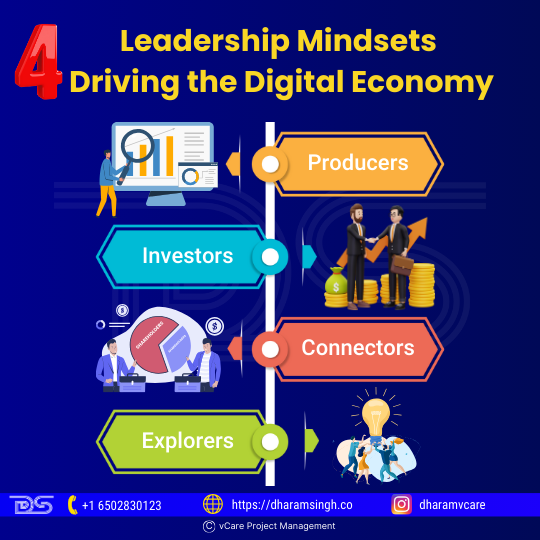
Leadership Mindsets Driving the Digital Economy
- Producers
The producers’ mindset blends with creating consumer value, emphasizing analytics, digital savvy, execution, and outcomes. Producers use analytics to expedite innovation that addresses shifts in customer preferences and enhances customer and user experiences.
- Investors
Leaders with an investor mindset seek a purpose for their firm beyond improving shareholder returns. They are committed to growth but in a sustainable way. They are concerned about the areas in which they operate, their personnel’s welfare, and ongoing development. They focus on increasing the value of their clients rather than treating them as money sources.
- Connectors
Leaders with a connector’s mindset see that mastering connections and networks is the new currency driving corporate performance in the new economy. Connectors understand this fundamentally. It’s how they work. They constantly bring various stakeholders from within the organization and ecosystem partners together. Connectors recognize the importance of building a feeling of community and belonging, which is especially vital in today’s fast-paced, breakneck-speed world when losing contact with the human touch is too easy.
- Explorers
Leaders with an explorer’s mindset are curious and innovative and thrive on ambiguity. They constantly experiment and learn by listening to a wide range of voices. Establishing behavioral standards encouraging risk-taking and failure, reverse mentorship, and a deep curiosity about how new forces shape the competitive environment are strong indicators of an explorer’s attitude.
Final Thoughts
Project management is a demanding task requiring effective leadership styles and traits for the project’s overall success. Successful project leadership involves team building, adaptability, communication, and effective planning skills. As a result, leaders play a fundamental and crucial role in project management since their approach decides whether a project will succeed or fail.
Project management is different from leadership. Successful project managers may need to be more effective leaders. However, they can learn leadership qualities and become successful leaders. In today’s firms, competent project managers must also be strong leaders. Successful project managers may use their innovative and creative capabilities to assist them in acquiring leadership skills that will complement their project management abilities by recognizing the difference between project management and leadership and adopting the road to becoming influential leaders.
The common component of project management and leadership is the standard by which the project manager and leader’s performance is judged. A project manager’s success and a leader’s effectiveness are evaluated in terms of the performance of the followers—the team’s performance. As a result, improving project managers’ leadership skills with an emphasis on abilities to increase team performance should be a key factor.
Leadership is critical in project management and must be balanced. It impacts project success and the value offered to the organization. The good news is that the finest project management training incorporates leadership concepts, providing employees with a well-rounded understanding of what it takes to lead a project.
With advanced certifications like PMP®, Agile, PgMP®, and PfMP® certifications, one can develop project management skills, be a good problem solver, be a more competitive candidate for positions, and be a successful project leader. In today’s competitive business world, one must be skilled and experienced to succeed and grow their career.
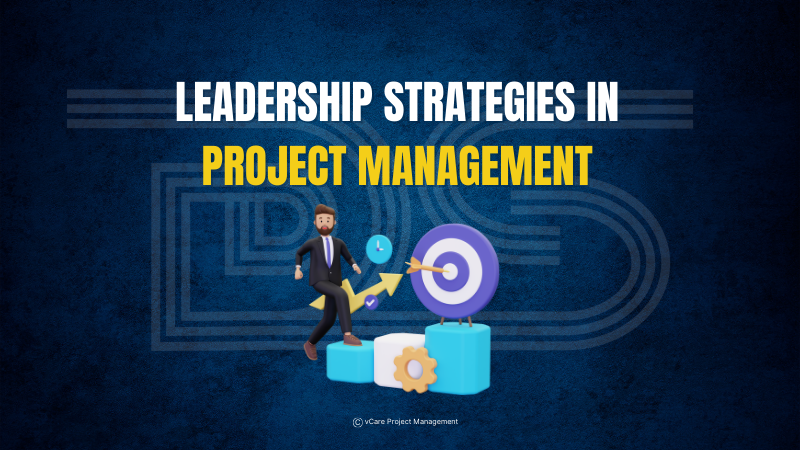
by DharamCW | Aug 18, 2024 | Leadership in Project Management, Project-Program-Portfolio Management Knowledge
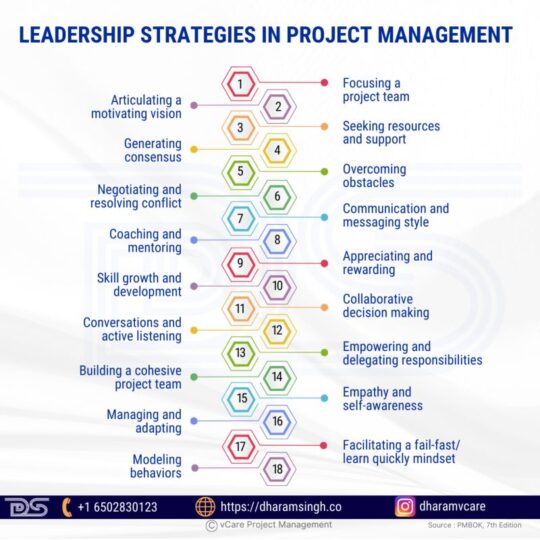
Master leadership strategies in project management with insights from PMBOK 7th Edition.
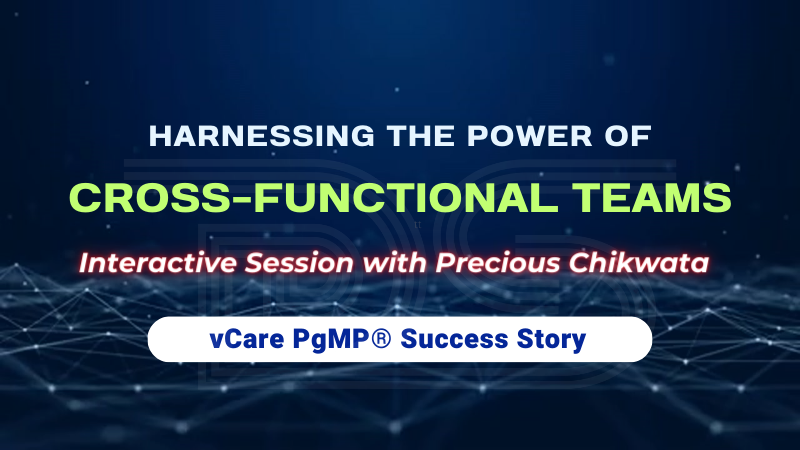
by DharamCW | Feb 5, 2024 | Professional Development Webinars
Enhance Your Leadership in Project & Program Management: Harnessing the Power of Cross-Functional Teams
Join me for an exclusive webinar where Precious Chikwata PMP®,MBA,PgMP®PgCert Cybersecurity, a prominent Project & Program Management Professional from Melbourne, Australia, will impart wisdom on steering teams through today’s complex project landscapes.
In this enriching session, Precious will unravel on the following topics:
🌀 Building resilient teams for crisis navigation
🌀 Debunking myths in cross-functional teams and overcoming challenges
🌀 Enhancing collaboration and breaking down silos in project/program management
🌀 Key skills for program managers in leading diverse, multifunctional teams
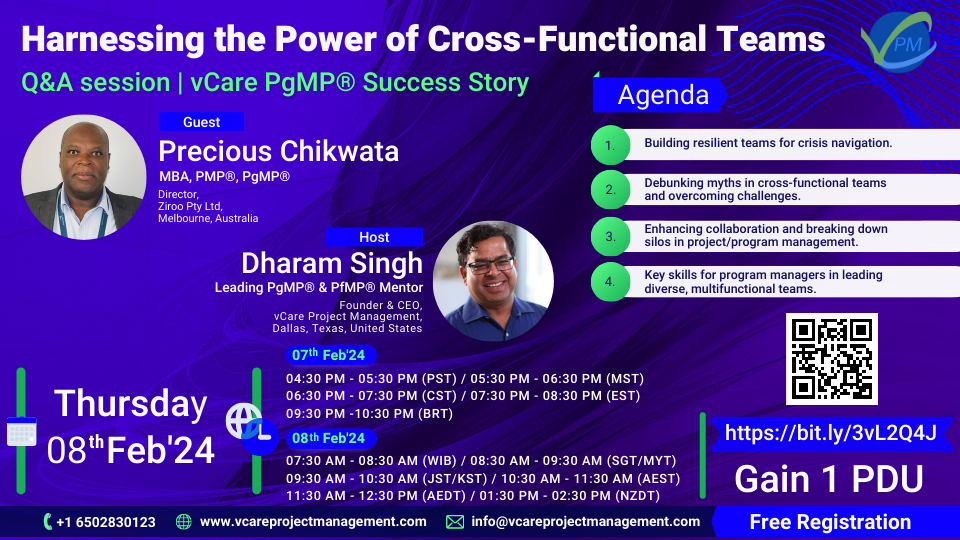
Harnessing the Power of Cross-Functional Teams
Why attend? Beyond the invaluable knowledge, earn 1 PDU to further your professional development.
🔗 Reserve your spot now: https://bit.ly/3vL2Q4J
Let’s connect, learn, and lead together in the evolving world of project management.
Session Date & Time:
07th February 2024 (Americas)
04:30 PM – 05:30 PM (PST) / 05:30 PM – 06:30 PM (MST) / 06:30 PM – 07:30 PM (CST) / 07:30 PM – 08:30 PM (EST) / 09:30 PM – 10:30 PM (BRT)
08th February, 2024 (ASEAN & Oceania)
07:30 AM – 08:30 AM (WIB) / 08:30 AM – 09:30 AM (SGT/MYT) / 09:30 AM – 10:30 AM (JST/KST) / 10:30 AM – 11:30 AM (AEST) / 11:30 AM – 12:30 PM (AEDT) / 01:30 PM – 02:30 PM (NZDT)
🚀 Elevate Your Project Management Career:
– Book an obligation-free consultation session on Project management Career, training, and certifications: http://bit.ly/2SbhTOK
– Discover training offers and certification discounts: https://bit.ly/3jWVepD
– Stay updated with our Q&A series and certification success stories by subscribing to the vCare Project Management YouTube channel at https://bit.ly/2YF0wJl
– Follow my podcasts and interviews with Project Management Experts on YouTube at https://bit.ly/2NDY8wd
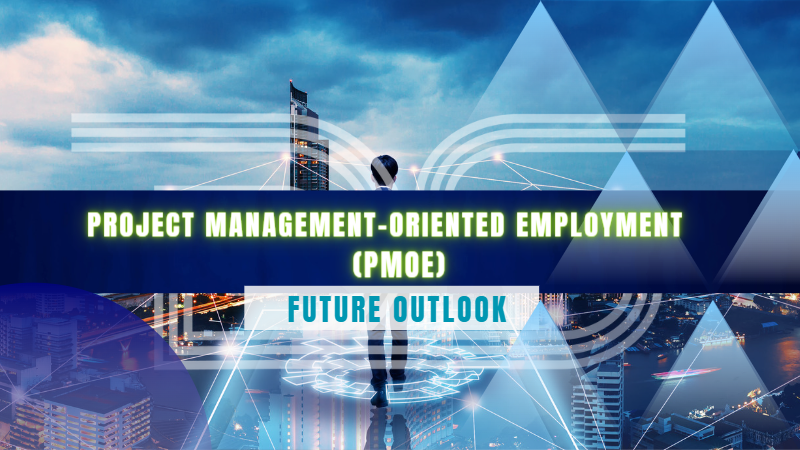
by Dharam CW2 | Jul 19, 2023 | General
Project management is a fulfilling career choice that may offer competitive pay and a wide range of job opportunities. As a result, project managers are constantly in demand: Qualified individuals are always needed to plan and provide work in every business.
Over the next ten years, demand for project managers is one of the roles which will expand faster than the need for workers in other roles. But on the other hand, organizations may face risks due to the talent gap.
Understanding PMOE
Projects are becoming an increasingly important component of business completion. The acceleration of business evolution, increasing emphasis on digital transformation, and ever-changing consumer expectations and competitor offers are here to stay. As a result, project management skills and talents are becoming increasingly important in organizations.
Organizations will not invest in training the people in those positions to accomplish that work if those roles are not recognized as contributing to project management. As a result, they will not foster an environment where employees may develop experience, and they will eventually find themselves unable to sustain the number of projects that must be delivered.
One of the reasons that technical roles are considered part of PMOE is the growing adoption of agile ways to deliver work. However, many organizations still see agile as a ‘project management free’ delivery method, where the self-organized nature of agile teams eliminates the need for project management. But, again, this thinking must change if there is any hope of closing the skills gap.
Organizations must assess their skill profiles for all roles and determine if project management competencies should be included. Even roles that do not entail daily project delivery or where employees are more frequent contributors than leaders are likely to benefit from project management skills and experience. Unless that is ‘built in’ to job profiles, hiring and development methods will remain the same, and the shortage will remain unaddressed.
Talent Gap Report 2021
Successful projects are a significant contributor to global economic growth. As more industries become projectized, the demand for qualified project managers will likely rise over the next decade.

The Talent Gap Report 2021
The Talent Gap Report 2021 has been released by the Project Management Institute. The headline is the scarcity of qualified candidates for project management-oriented employment (PMOE). As a result, around 25 million more employees will be required by 2030 than in 2019. To put this in context, there were 90 million workers in those positions in 2019, implying a 30% increase.
Simultaneously, 13 million existing project management-oriented employees will retire, with the vast majority nearing the top of the experience curve. This phenomenon implies that enterprises will lose significant knowledge and skill. And this will happen when they increase the need for that experience by introducing a large number of new project-related staff who must progress quickly. In developed economies, on the other hand, retirement is the primary source of job possibilities for younger workers.
The report’s most critical statement comes near the end: “Global demand for project management expertise is unlikely to be addressed by 2030 unless firms encourage a culture of continuous learning.” As a result, firms confront a huge growth in PMOE roles and an inability to address that requirement based on current business processes.
Addressing challenges of this magnitude demands a strategic approach backed by financial commitments and constant responsibility for performance. In some circumstances, it may also necessitate a transformation in how leaders understand their companies and roles.

3 Reasons For The Project management Talent Gap
Why and where is the Talent Gap?
There are three reasons for the project management talent gap:
- The number of positions requiring project management skills is increasing.
- Project managers are in high demand in emerging and developing companies.
- Project managers are retiring faster than young talent can replace them.
Upskill the people
Unless firms foster a culture of continuous learning, the worldwide need for project management skills is unlikely to be met by 2030. The most resilient firms will prioritize reimagined employee capability-building.
According to a McKinsey report, over 80% of business leaders consider skill building to be “very” or “very” vital to their organization’s growth, up from 59% before the pandemic. As a result, organizations will need to support new learning initiatives and seek partnerships to equip employees with the appropriate project management skills to develop their talent. These talents include power skills like teamwork and leadership; business acumen to develop well-rounded employees; and mastering new methods of working, such as growing use of tech-enhanced problem-solving tools.
Gaining a Competitive Advantage in the Talent Acquisition Race: The Front-Runners
According to PMI and PwC study, a cohort of 250 organizations face fewer challenges in attracting and retaining talent than their counterparts. Their project management offices (PMOs) are better connected with corporate strategy—three quarters have a C-suite presence, and 90% are seen as strategic partners by their executive leaders. As a result, they have an easier time recruiting people with important project skills. They are more successful at developing project managers. They are also twice as likely to have outperformed in revenue growth, customer acquisition, customer happiness, and environmental, sustainability, and governance (ESG) indicators.
Facilitating project-based organizations
The concept of stable operations is unlikely to exist at any scale by 2030, which is one of the most important factors driving the demand for more individuals in PMOE roles. The rapid growth of technology has resulted in much shorter lifecycles for both customer-facing and internal solutions. This trend is expected to continue as digital transformations drive organizations to the point where technology is vital in managing every business area.
Future of project management
Project management is being massively disrupted by management technology. As a result, forward-thinking professionals are questioning how to effectively prepare for the upcoming tidal wave of change caused by technological innovation.
Here are four skills that project managers of the future might need:
- Data Science
- Conflict resolution
- Entrepreneurship
- Resource management
Project Management’s Future in the Age of Advanced Technology
Because of emerging trends such as remote teams, digitalization, and automation, project management has changed dramatically in recent years. As a result, companies now rely significantly on technology to plan, execute, and monitor work. As an example:
- Big data and artificial intelligence for better risk forecasting
- Remote progress tracking using digitization technologies
- Automation software for more efficient execution
These innovations have improved firms’ management capacities and altered project management’s future. According to Gartner research, 80% of management duties will be automated by 2030, and future managers will need more technological abilities. They must be knowledgeable about cybersecurity, blockchains, machine learning, and robots, all of which are expected to play larger roles in management.
Future Trends of Project Management
Consider project management ten years ago: fewer tools, smaller teams, and more straightforward tasks. Since then, the project landscape has changed dramatically, with major trends such as:
- Blockchain
- Artificial intelligence
- Sustainability
- Remote teams

Future Trends of Project Management
Trend 1 – Blockchain
More companies use blockchain technologies for management, such as when conducting dispute investigations. The capacity of blockchain to automatically update data makes it ideal for reconciling records and transactions. One of the most significant contributions of blockchain to project management will be smart contracts, which are effectively self-executing contracts powered by computer code.
Smart contracts reduce the number of key functions within the project manager’s scope, such as checking on project milestones and assigning new ones, which speeds up management processes. As a result, quicker workflow assures project completion on time and improves a company’s overall performance.
Trend 2 – Artificial Intelligence
Artificial intelligence quickly infiltrates project management systems, handling anything from predictive analysis to risk management. Because of its efficacy, AI is expected to contribute:
- $42.7 B (7.7%) to Egypt’s economy
- $135.2 B (12.4%) to Saudi Arabia’s economy
- $96.3 B (13.6%) to the UAE economy
The primary capacity of AI is to provide data insights for decision-making, which increases the agility of any given project. For example, assume a manager considers which product features to include; AI finds correlations and patterns in consumer data and then recommends which product features are more likely to sell. Such insights improve an organization’s competitiveness by avoiding commitment to poorly planned, hazardous ventures.
Trend 3 – Sustainability
Today, project sustainability is more crucial than ever. Governments and societies all around the world are demanding greener approaches throughout the life cycle of a project.
Green initiatives are cost-cutting methods from a business standpoint. For example, energy is required for project execution, and shifting to renewable sources reduces costs. In addition, this frees up resources for other essential areas, such as innovation and research. Meanwhile, sustainable practices improve a company’s brand and foster consumer loyalty.
Trend 4 – Remote Teams
Remote teams have been the norm since the advent of communication technology. As a result, businesses gain from a more diverse and borderless talent pool easily available through contracts. In addition, they spend less on office space, travel, and other administrative expenses.
As a result, it’s not unexpected that 65% of workers anticipate that workplaces will become entirely virtual over the next several years. In general, remote working arrangements enable businesses to extend their resources while increasing operational efficiency. As such, they are crucial in developing lean, competitive firms.
Skills Future Project Professionals Need
To stay up with modern project management trends, a fundamental understanding of ideas such as data science, conflict resolution, and entrepreneurship is required. For example, understanding data science may assist a manager in incorporating AI into more elements of the project life cycle.
Here’s a closer look at what these talents comprise and how they’ll stay up with future project management improvements.

4 Skills Future Project Professionals Need
Skill 1 – Data Science
Big data insights are essential management tools, particularly for large projects with extensive life cycles. Insights from previous projects show inefficiencies that guide the current project, such as the number of slack hours and their causes. Data analysis assesses progress and uncovers deviations early, such as changes in material costs and currency rates that exceed expectations. As a result, project managers must comprehend topics such as statistical inference and regression analysis.
Skill 2 – Conflict Resolution
Today’s projects are extremely complicated, with constantly changing deliverables. As a result, conflicts are never far away. These issues, if left unaddressed, can undermine the team’s performance, resulting in delays and missed deliverables. Managers must thus grasp the various aspects of conflict resolution, such as:
- A conducive work environment’s behavioral and organizational components
- Effective communication
- Effective contingency planning
Skill 3 – Entrepreneurship
Project managers are, in essence, CEOs. On the one hand, they manage project deliverables. Yet, simultaneously, they negotiate with shareholders and set goals based on estimates. As a result, being effective requires more than technical and administrative skills.
Entrepreneurial skills, such as strategic thinking and market insight, are also required of project leaders. Such skills are especially important when modifying deliverables, typical in agile projects like software development.
Skill 4 – Resource Management
Budgets and timeframes became tighter as projects became larger and more complicated. Today’s project managers must balance budgetary constraints, quality delivery, and achieving deadlines with limited resources. They are entrusted with creating a lean organization.
For optimal efficacy, a precise balance of resource allocation is required, as over-allocation to one activity inhibits the others. As a result, managers must understand resource management principles such as equilibrium shifts and flexibility.
Bridging the talent gap
The PMI Talent Gap report delves into a decade’s worth of project management-related job trends, costs, and global implications. PMI has completed its most recent study of the “projectized” businesses that leverage these talents better to understand talent and employment trends in project management. Using data from selected areas, the PMI Talent Gap report provides a birds-eye perspective of the most in-demand talents and the magnitude of the talent shortfall.
PMI data shows a continuing gap between the global demand for project management skills and talent availability. This data translates into many new career prospects in PMOE for job-seeking project professionals. However, the skill shortage is a significant issue for firms that rely on project leaders and changemakers. For example, by 2030, this skill gap is anticipated to affect every area, resulting in a potential global GDP loss of up to US$345.5 billion.
Here is a summary of the top three reasons for the skill gap, as identified by PMI research and explained in the report:
- An increase in the number of professions that need project management expertise.
- Economic growth drives demand for project managers in emerging and developing countries.
- The rate of labor-force retirement
Final Thoughts
Project management has a bright future. There is still a high demand for change agents. PM will transition from being viewed as an administrative function by some executives to the strategic partnership that it has the potential to be in every organization, not just those enlightened businesses with high levels of program management maturity.
For many years, the skills of project managers have migrated toward “soft” skills. However, given how the future of work is shaping, this will become much more important. Project managers will need to be team players. As a result, we’ll need to interact with people who have the skills that the technical companion lacks:

Skills That The Technical Companion Lacks
- Empathy
- Strategic thinking
- Fun
- Creativity
- Motivation and persuasion
- Thoughtful customer service
- Listening
Feel free to check out my discussion on this topic with Justin Buckwalter in YouTube
For any questions related to your Project Management career, training, and certifications, you can book an obligation free 15 minutes session with me by visiting talktodharam.com
You can subscribe to the vCare Project Management YouTube Channel to catch future videos of our Q&A series and certification success stories: https://bit.ly/2YF0wJl
You can subscribe to and follow my podcasts and interviews with Project Management Experts on YouTube at https://bit.ly/2NDY8wd
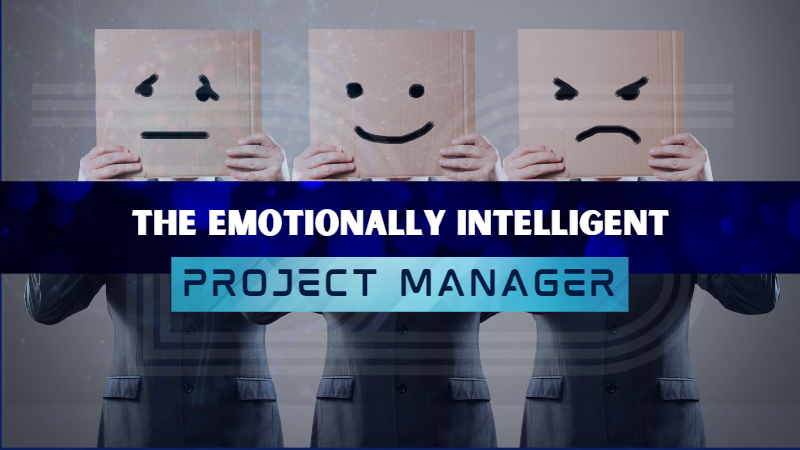
by Dharam CW2 | May 19, 2023 | General
Emotional intelligence in the workplace is becoming increasingly important for leaders and project managers as remote work became more prevalent due to the pandemic. Success in project management and managing cross-functional remote teams is only possible with emotional intelligence.
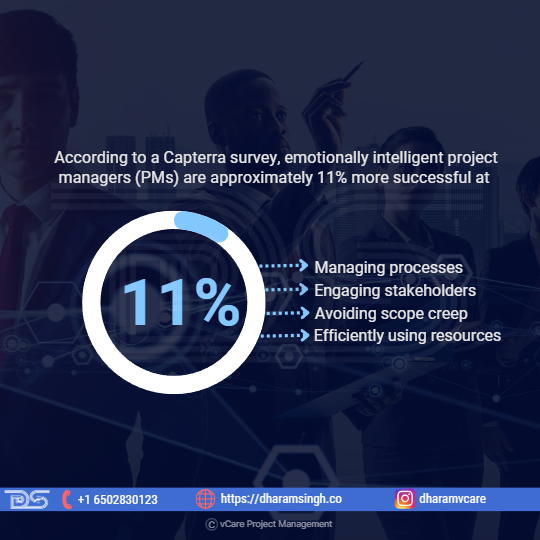
Capterra Survey
According to a Capterra survey, emotionally intelligent project managers (PMs) are approximately 11% more successful at managing processes, engaging stakeholders, avoiding scope creep, and efficiently using resources than PMs who lack this skill.
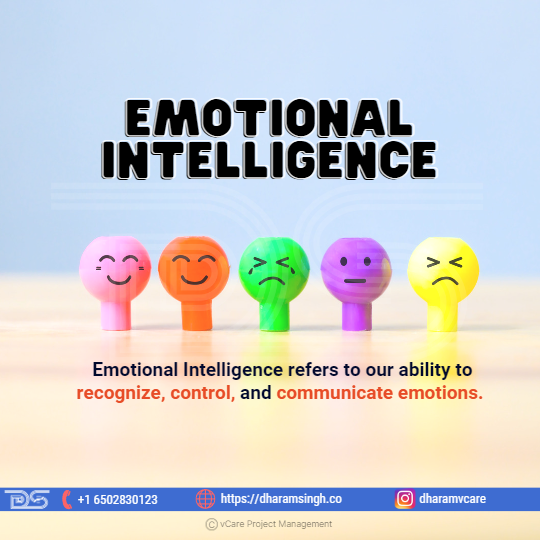
Emotional Intelligence
What is Emotional Intelligence?
Emotional intelligence refers to our ability to recognize, control, and communicate emotions. People with high emotional intelligence understand how they feel, what their feelings imply, and how their feelings affect others. In interpersonal situations, it is also the ability to empathize with others. Emotional intelligence is about creating a positive work environment, which is critical to the success of any project.
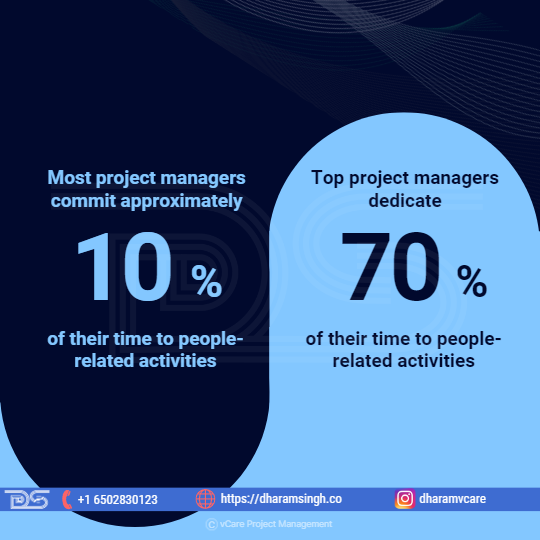
As Per LiquidPlanner Study
According to a LiquidPlanner study, most project managers commit approximately 10% of their time to people-related activities. Top project managers dedicate 70% of their time to these activities. As a result, we can conclude that emotional intelligence is crucial for project success.
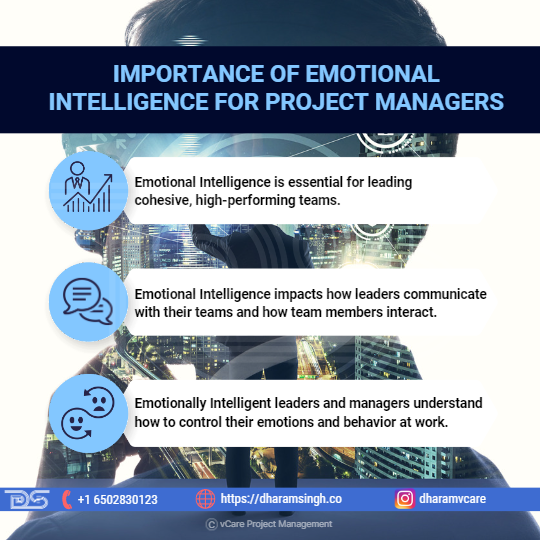
Importance of Emotional Intelligence for Project Managers
Importance of Emotional Intelligence for Project Managers
- Emotional intelligence is essential for leading cohesive, high-performing teams.
- According to researchers and behavioral scientists, Emotional intelligence impacts how leaders communicate with their teams and how team members interact.
- Emotionally intelligent leaders and managers understand how to control their emotions and behavior at work, which includes providing safe environments for exchanging ideas and feedback, productive teamwork and performance, good morale, employee engagement, and job satisfaction. They manage workplace stress and conflict with care and educate their team members to do the same.
Characteristics of Emotional Intelligence
What can project managers do to help themselves develop and become more aware? First, let’s examine five abilities for raising emotional intelligence:
- Self-Awareness – The ability to sense, identify, and comprehend emotions is self-awareness. Unfortunately, many of us were taught to ignore our emotions in the past. However, it is critical to be aware of your feelings to make appropriate decisions and act accordingly. Those with high self-awareness are self-assured, authentic, open to feedback, and capable of maintaining perspective throughout all project phases.
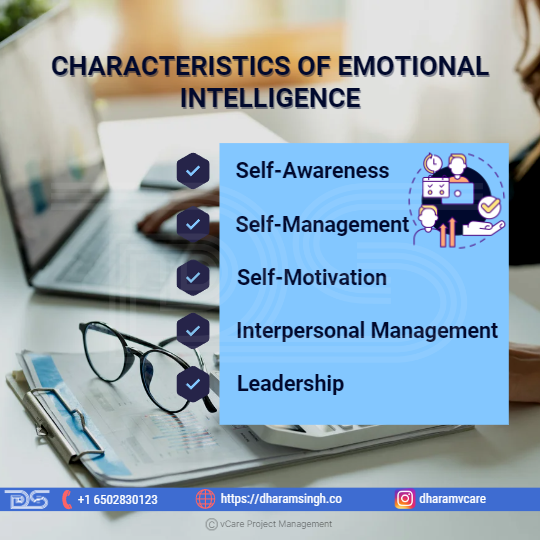
Characteristics of Emotional Intelligence
- Self-Management – Self-management is the ability to reason well while understanding feelings. Many frequently react based on their frame of reference rather than selecting a response based on their current unique circumstances. Self-managers are deliberate in decision-making, taking the initiative, framing events appropriately, maintaining perspective, and responding quickly. They understand their feelings and why they have them and effectively manage their responses.
- Self-Motivation – Self-motivation is the ability to channel the power of your emotions toward a specific goal. When project teams have a purpose, these ‘P’s follow peace, passion, power, perspective, and potential leverage. Self-motivators who are influential are optimistic and have a positive attitude. They can delay gratification and assert themselves.
- Interpersonal Management – The capability to identify and respond properly to the emotions of others is referred to as interpersonal management. If you can connect with people and acknowledge their humanity, they will answer openly, leading to common trust.
- Leadership – An emotionally intelligent project manager inspires guides, challenges, and supports the team. Leadership is defined as the ability to create and communicate vision and passion for assisting individuals and organizations in reaching their full potential.
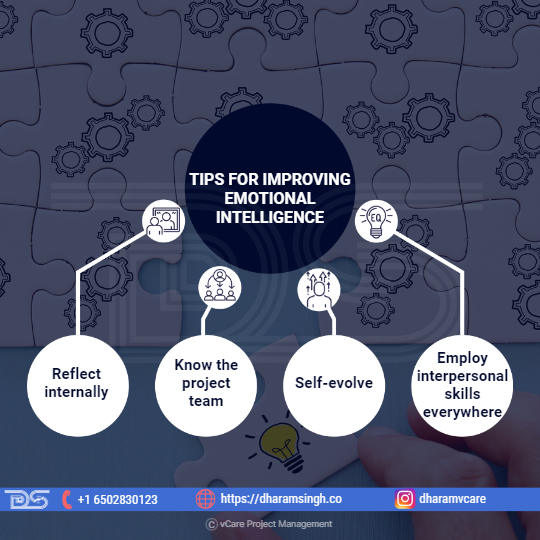
Tips for improving Emotional Intelligence
Tips for improving Emotional Intelligence
- Reflect internally – To become more emotionally aware, one must first understand their emotions and then regulate them in stressful situations. Next, they have to figure out what motivates them. Finally, authenticity is necessary to develop emotional intelligence by leading a successful project team and establishing meaningful relationships with stakeholders.
- Know the project team – Project managers are usually aware of the people they must contact when working on a project. However, understanding the project team, from team dynamics to personalities to dealing with conflict and stress, is just as important. To improve emotional intelligence, one must first get to know their team, communicate with them, and understand their emotions. It will also help the success of their project. This job becomes even more important for teams that operate in multiple locations and are diverse.
- Self-evolve – Along with other important leadership talents, project managers should work to improve their emotional intelligence regularly. Conditions surrounding a project frequently change; its scope may shift, the number of stakeholders may increase, and projects may eventually end.Every project is distinct, and no project manager can complete a project independently. Therefore, it is advantageous for project managers to consider what they learn during and after a project. For example, consider how a project team operated, what they witnessed during critical times with stakeholders, and their team’s performance.
- Employ interpersonal skills everywhere – Emotional intelligence can be helpful in almost any project management situation. For example, people may feel compelled to sign off on a strategy to minimize delays while managing scope changes or project risk. Following the resolution of such issues, an emotionally intelligent project manager would pursue people because they notice that this could lead to more severe problems in the future.
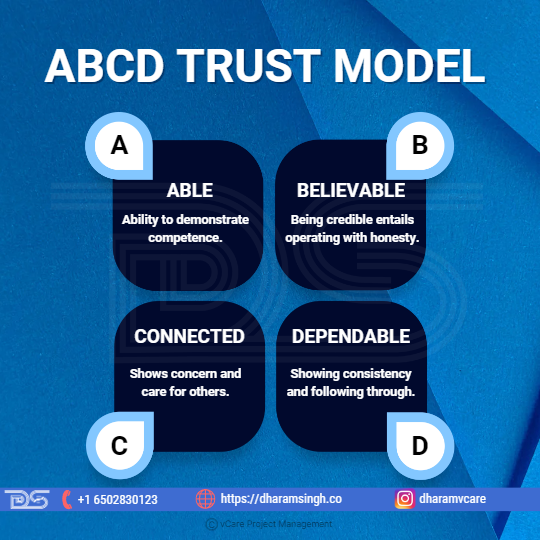
ABCD Trust model
ABCD Trust model
Better relationships will result in better outcomes. That is why developing trusted connections is critical to the success of your organization. When individuals trust one another, they may work efficiently together.
It is well known that low trust harms morale, productivity, and turnover. To prevent these traps, Ken Blanchard created the ABCD Trust Model to help executives understand the activities that affect creating trustworthy relationships.
Blanchard suggests four critical aspects for leaders to develop trust with people: Able, Believable, Connected, and Dependable.
- Able – The term able refers to the ability to demonstrate competence. Leaders demonstrate competence by possessing the necessary skills, education, credentials, and experience. They also exhibit their capacity to lead by accomplishing achievements. Able leaders can encourage people and collaborate with them to achieve goals.
- Believable – Being credible entails operating with honesty. Believable leaders adhere to a set of core beliefs. They know what they stand for and will not compromise their principles under pressure. Being credible also means maintaining promises and not lying or stretching the truth.
- Connected – Connected shows concern and care for others. This aspect fosters trust and contributes to a more engaged workplace atmosphere. Being linked entails attending to people’s needs and promoting their well-being. Leaders also build relationships by giving information not only about the organization but also about themselves. Employees are significantly more likely to provide their best effort when they feel linked to leaders.
- Dependable – Dependable means showing consistency and following through. It entails holding oneself and others accountable for commitments. A trustworthy leader will accept responsibility for their acts and help their followers face adversity.
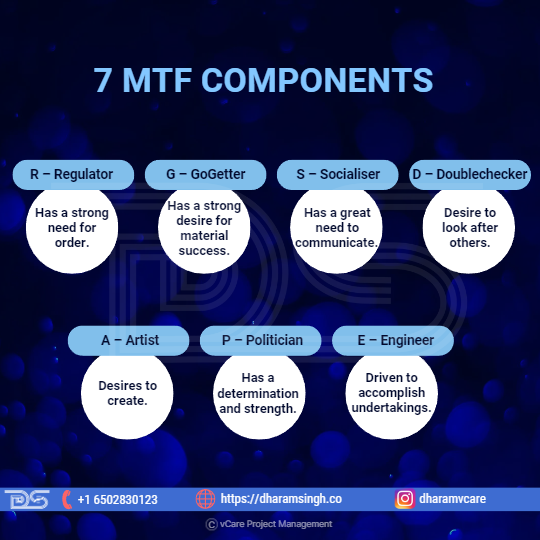
7MTF Components
7MTF Components
The 7MTF model is composed of seven components. We all have all 7 in our personalities; as adults, 2 to 4 will be strong, some will be weak, and others will be ordinary. This mix of elements is one of the most significant variables in deciding our temperament – our emotional predisposition.
- The R – Regulator (formerly known as the Normal) – A person with a ‘strong R’ has a strong need for Order. They will be mature, responsible, calm, and emotionless. You may hear the words ‘should,’ ‘ought,’ and ‘logical’ in their language. They have high expectations of themselves and others, including those with whom they live and work.
- The G – GoGetter (formerly known as the Hustler) – A person with a ‘strong G’ has a strong desire for material success. This individual entails enjoying money and the things it can purchase. The G is quick, opportunistic, intelligent, enterprising, and charming. They are short-term in nature, expecting results immediately or very soon. Promising a G a large monetary reward next year is unlikely to pique their attention.
- The S – Socialiser (formerly known as the Mover) – The ‘strong S’ personality has a great need to communicate. This aspect implies talking about people, fun, events, what you did over the weekend, or anything related to life. Hence, their straightforward, friendly, and frequent grin immediately.
- The D – Doublechecker – The ‘strong D’ is characterized by a desire to look after others and ensure everyone is safe. When you encounter a strong D, expect someone obedient, loyal, and concerned with doing the right thing. One of their greatest assets is their ability to anticipate difficulties and hazards.
- The A – Artist – A person with a ‘strong A’ desires to create. “I want to be different,” is what they would say. These hardworking individuals are conscientious and do not wish to offend anyone. Seek for anything unusual about their attire, such as innovative earrings, cufflinks, a six-button jacket, or an all-black ensemble!
- The P – Politician – A solid handshake and direct eye contact indicate that the ‘strong P’ is determined to win. This person has a determination and strength that others may find challenging. The spoken word is the strong P’s stock in trade – look for status markers like the huge Mercedes in metallic blue.
- The E – Engineer – A person with a ‘strong E’ personality is driven to accomplish undertakings. The strong E has traits such as process, detail, and procedure. This individual can form a strategy and make it happen as soon as they see anything. The E is concerned with completion. So, unless you can assist, you should avoid getting in the way!
Wisdom – strive for mental stability and individual resilience – 10 Competencies
Wikipedia defines wisdom as the “ability to contemplate and act using knowledge, experience, understanding, common sense, and insight.” Psychologists have created a list of ten competencies that are typical therapies in their field and are referred to as wisdom. Self-awareness, self-control, and empathy are the three components of emotional intelligence (EI). Although the fourth component of EI is not formally mentioned among the ten competencies, social influence or influencing others may be considered a result of being highly effective in the other areas.
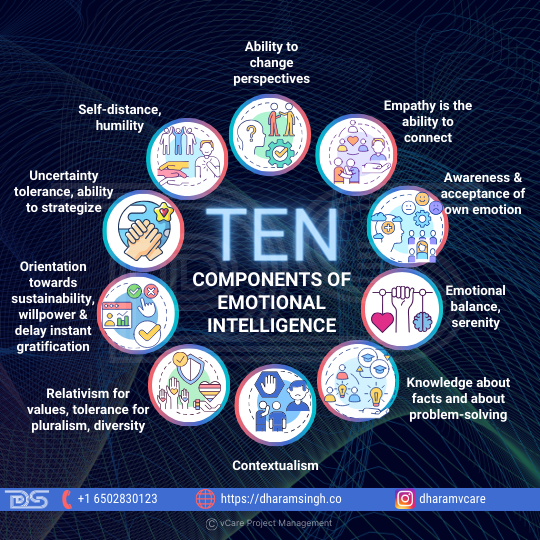
Ten Components of Emotional Intelligence
- Ability to change perspectives – In a bipolar environment, it is possible to remain trapped in one thought and dislike the other viewpoint with strong emotions, which may lead to violence. The ability to look for and identify more points of view implies a shift in viewpoint. Some of the therapies used to treat mental illnesses can help with this. Examples include role-playing, acting, visiting people in various countries, learning about diverse cultures, and brainstorming.
- Empathy is the ability to connect – Understanding people’s intentions, current state of mind, emotions, and mindsets is necessary for being heard, establishing trust, and influencing others. In addition, active listening techniques may help you focus outside yourself and view others as humans who vary from ourselves.
- Awareness & acceptance of own emotions (self-awareness) – Self-awareness leads to increased self-confidence and sincerity. It refers to mindfulness, or being aware of one’s feelings, and is required for self-control and emotional balance.
- Emotional balance, serenity (self-control) – Patience, serenity, and avoiding knee-jerk reactions make you more popular and respected and contribute to mental tranquility. Having a mentor can help you develop and fine-tune this skill.
- Knowledge about facts (know what, assimilation) and about problem-solving (know-how, accommodation) – Wisdom includes knowledge; therefore, it has two components.
- On the one hand, we have factual knowledge about a topic; on the other, we may be specialists in a (typically technical) area. This heuristic knowledge and assimilation are how we apply established systems to circumstances.
- On the other hand, when we encounter new situations or topics, we use accommodation to apply our problem-solving skills. We employ our epistemic intelligence and heuristics to do this.
- Contextualism (consider the situation, timeline, and social relevance) – Even though we have theories and may find similarities in new scenarios, each situation is unique and depends on the circumstances, the context in which the problem develops, and the societal importance. This capacity is achieved via awareness and avoiding picking a solution that works in another context without first examining the present dependencies of the situation.
- Relativism for values, tolerance for pluralism, diversity (which is hard if you are part of the same belief systems for most of your life, like nations and churches) – There are many truths (this is known as non-monism), and yours is only one of them. Others have the right to their realities, which are based on the cultures in which they live, their beliefs and experiences, and the facts to which they have access. Value relativism allows one to accept and appreciate the values of others.
- Orientation towards sustainability, willpower, and delay instant gratification (perspective of linear and circular time flow) – We can pursue long-term goals and make decisions with both short and long-term consequences in mind.
- Uncertainty tolerance, ability to strategize (imaging solutions for scenarios) – Accept that life is unpredictable and swim through it like a river, adapting to currents and waves as they come.
- Self-distance, humility – Do not believe you are the center of the universe, which will remain when you die. Avoid being a taker rather than a giver by avoiding jealousy, bragging, pride, and greed.
Final Thoughts
For today’s project managers, emotional intelligence is a critical concept. Many companies are looking for project managers with strong technical and soft skills. Emotional intelligence is crucial in project management because it enables project managers to improve communication and collaboration in the workplace. It is essential to mention that emotional intelligence can be imparted and nurtured. This aspect implies that as a project manager, one can better oneself by controlling feelings and emotions and developing positive behaviors to influence others at work. One will make better decisions about other people’s emotions, strengths, and weaknesses once they have recognized their thoughts.
Feel free to check out my discussion on this topic with Thomas Walenta in YouTube
For any questions related to your Project Management career, training, and certifications, you can book an obligation free 15 minutes session with me by visiting http://talktodharam.com/
You can subscribe to the vCare Project Management YouTube Channel to catch future videos of our Q&A series and certification success stories: https://bit.ly/2YF0wJl
You can subscribe to and follow my podcasts and interviews with Project Management Experts on YouTube at https://bit.ly/2NDY8wd






























Leadership plays a crucial role in the success of a project. In Project Management, effective leadership is essential for achieving positive outcomes. The PMBOK 7th Edition highlights various strategies that can improve leadership skills within a project team. Emphasizing skills such as focusing on agreed-upon goals, articulating motivating visions, and fostering collaboration is vital for overcoming obstacles and driving progress. From conflict resolution to promoting self-awareness, every aspect of leadership contributes to a cohesive team and project success.